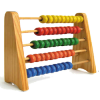Arithmetic without Calculators
Lesson Plans > Mathematics > Mental MathArithmetic without Calculators

My Algebra students have spent most of their school careers being told that they can't use calculators. Thus, they are stunned the day they walk into my Algebra One class and are told they're free to use them. I become their instant hero. But I do give them a couple caveats.
First, of course, is that I might, at some point, give them a test or quiz that they're not allowed to use them, but that I'll always warn them of that in advance. (The reason I do that is that occasionally we do things like order of operations practice, or fractions problems, that I need to know they have the process down so they'll be able to handle it once variables are inserted in the problems!).
The second thing I tell them is, even though they are free to use their calculators, I find that, in general, students who rely on their calculators do the work about a quarter the speed as students who don't rely on them. "What happens," I say, "if I ask you what 6 times 8 is? Those of you who don't know that multiplication fact will pull your calculator out..." here I, with exaggerated slowness, pull out an imaginary calculator and begin punching imaginary buttons painfully slow, "...and punch in SIX...TIMES...EIGHT...EQUALS...and while you've done that, your classmate who knows that 6x 8 is 48 will have already gone through the next three steps, and maybe even have moved on to the next problem."
So even though I tell them they can use the calculators, I encourage them to think first, to decide if they really need it. Occasionally when we're all working a problem together on the board, I'll have a very simple math fact I need, like "What's 5 x 10?" and after a dramatic pause, I'll say with mock horror, "Did I really just hear someone reaching for their calculator?"
I also, when we're working problems together, try to surprise them with math facts that I know. For example, we might be trying to factor the quadratic x2 - 2x - 168, and I'll say without hesitation (even though I don't have a calculator) that must be (x - 14)(x + 12). They want to know how I'm able to do that so quickly in my head, and instead of answering them, I'll say, "Someday I'll show you; you don't know enough algebra yet." This puzzles them, because they don't see how algebra can help you do arithmetic.
Later (usually when they're taking Algebra Two), there will come a day when we have some time to kill in class, and I'll say to them, "Would you like to know how I use algebra to help me do arithmetic?" Of course, it gets them out of doing something else, so they're agreeable.
I write on the board something like 168 = 14 x 12. "Would you like to know how I did that in my head?"
"You memorized the answer!" someone always says.
"No...actually, I didn't. I knew the answer because I knew that 169 is 132."
"So?"
I write on the board: 168 = 169 - 1 = 132 - 12. "That," I say, "is a difference of squares." And I finish by writing: 168 = (13 - 1)(13 + 1)
That takes a moment to sink in. Then I say, "I also know that 165 = 11 times 15. Why? Because 165 = 132 - 22 = (13 - 2)(13 + 2)."
Then I let them try. Most of my students know that 144 is 122, so I write "143 =" and let them finish by concluding that this is 122 - 12, which means it's (12 - 1)(12 + 1) = 11 x 13.
Of course, this is a very special case requiring that the number be a difference of squares and that the students have a lot of perfect squares memorized.
The reverse is also true; if a student has to multiply 19 x 21, it's easiest to think of that as (20 - 1)(20 + 1) = 202 - 1 = 400 - 1 = 399.
Of if they need to multiply 14 x 18, that's (16 - 2)(16 + 2) = 162 - 22 = 256 - 4 = 252.
Other factoring rules can come into play, too. For example:
1001 = 103 + 13 = (10 + 1)(102 - 10 + 1) = 11(91)
27008 = 303 + 23 = (30 + 2)(302 - 30x2 + 4) = 32 · 844 = 25 · (22 · 211) = 27 · 211
Furthermore, the "sum and product" rule of factoring can come into play sometimes. When I see the number 198, the first thing that pops into my mind is "what two numbers add to 9 and multiply to 8?" If I can find an answer to that question, it might help me factor the number. In this case, the numbers are 1 and 8.
198 = (10 + 1)(10 + 8) = 11 · 18 = 2 · 32 · 11.
If I see the number 1224, I think:
1224 = 12 x 100 + 12 x 2 = 12(100 + 2) = 12(102) = (22 · 3)(2 · 3 · 17) = 23 · 32 · 17
These kinds of math tricks are not often useful, but if you're watching for them, it might surprise you how often you can use algebraic methods to factor or multiply numbers. Many students will roll their eyes and turn back to their calculators. But other students will start looking for these techniques whenever they have numbers they need to manipulate. For that handful of students, arithmetic ceases to be a boring chore, and becomes a possibility of discovering something fun and different. In the meantime, they keep those arithmetic facts fresh in their minds, and don't become too dependent on their calculators.
